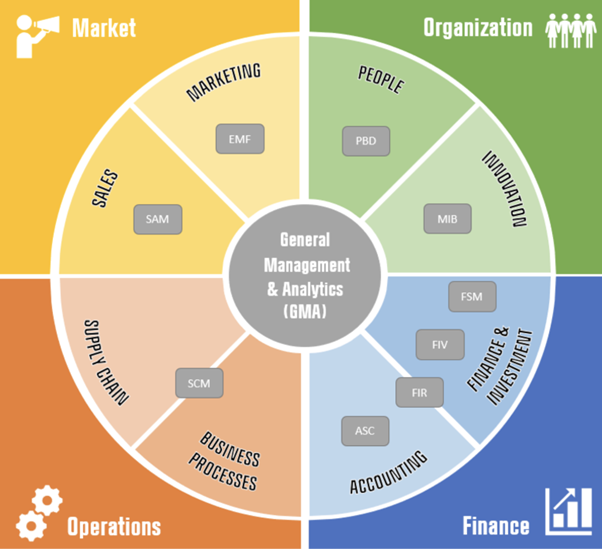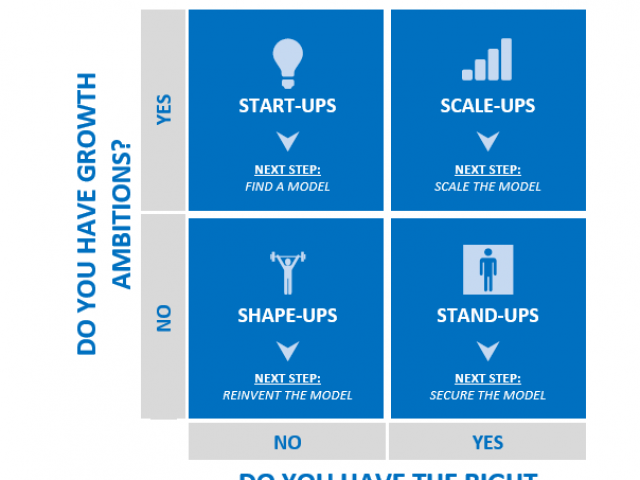OPINION Cand.merc. reform: Not a “sound process” – no time for student involvement

Tomas Vemola
OPINION: By Tomas Vemola, Student at BSc Digital Management, CBS Academic Council Member, Vice President, CBS Students
Opinion | 11. Nov 2022
At my oral exam, if I reasoned the same way as Senior Management does now, I would get a 4 at best. The issue of the MSc EBA (cand.merc.) reform is complex, and we are stuck between a rock and a hard place. Nevertheless, I do not find the decision-making of Senior Management satisfactory.
Does not fit the four domains? Out with it
Senior Management is basing its proposal on an initial proposal from the MSc EBA (cand.merc.) study board which used a framework of four domains to guide its decisions about which concentrations to close and which to keep.
The four domains each contain two subdomains and are as follows:
– Finance (Accounting, Finance & Investments)
– Operations (Business Processes, Supply Chain)
– Market (Sales, Marketing)
– Organization (People, Innovation)

This framework reflects the narrow view of business economics education as something that should map to functions within a company. The point of cand.merc. is seen as educating people to fulfil jobs in traditional for-profit corporations selling products in a market. Function first.
The fate of the concentrations is then decided by their fit in this framework. E.g. since Brand Communications and Management’s (BCM) core area (brand) is not reflected in the framework, it is set to close. It does not matter that the programme is high-quality, popular among faculty and staff and recognized internationally. It does not fit in the model, it goes out.
I also find it important to point out that the domains themselves were changing during the process. In the background information, the subdomains in “Organization” are titled “People, Strategy”. In the study board proposal, they become “People, Innovation”. Sounds eerily like making a choice between Management of Innovation and Business Development (MIB) and Strategy, Organisation and Leadership (SOL).
A sound process?
In the news on CBS Share (intranet for employees), Senior Management describes the process behind the proposal as “sound”. In full: “A sound process has qualified Senior Management’s recommendation for reform”. I do not find the following process “sound” at all.
Seven days to engage as a student
As a student representative in the Academic Council, this was the timeline
- 17 October, receive a proposal from the cand.merc. study board (in Danish)
- 24 October, Academic Council meeting (leaving less than a week to understand the issue and prepare to comment on it – the proposal is still confidential, and I cannot discuss it with other students)
- 3 November, Senior Management’s proposal is released
- 10 November, Senior Management dialogue meeting with students (less than a week to gather students’ views)
- 16 November, final decision to be made by senior management
In other words, a regular student had seven days to engage with the proposal. Seven days to understand the national, institutional, financial, legal and political constraints behind this proposal to effectively engage with it. That’s nothing short of impossible. And to this day, much of the background material is not broadly accessible to students.
Academic Council and reference group comment into the void
As soon as the MSc EBA (cand.merc.) study board’s proposal was released, senior management established a reference group to submit their recommendations to the proposal. Academic Council was asked to comment as well. Let’s look at the feedback from both fora.
Proposal fails to explain its rationale
First, apparently neither AC nor the reference group understood the rationale behind the proposal.
Academic Council in their minutes from meeting:
“Several members of the AC stated that they did not see a clear rationale and coherence behind the study board’s conclusions and the criteria functions in the background data across concentrations… More generally there seems to be a variation of the criteria used to evaluate different concentrations.”
Reference group: “It is unclear to the reference group which criteria have determine which concentrations to discontinue and which concentrations to continue… It is difficult to see [from the data] why exactly these concentrations are to be discontinued.”
When confronted with these comments at the Thursday dialogue meeting, Senior Management claimed that both the reference group and AC misunderstood the criteria for the decision. That the guiding criterion was in fact the concentration’s fit into the domain model.
This shows a fundamental failure of the proposal to lay out its methodology to stakeholders at CBS. Therefore, it seems all other comments are then rendered inapplicable since they are based on a fundamental misunderstanding of the proposal’s way of thinking.
Proposal fails to reflect on strategy
CBS’ strategic ambition is to “Transform society with business”. One would expect a thorough reflection on how this proposal gets us closer to that. However, that is not the case as per the feedback.
Academic Council: “Several members stated that the proposal lacked reflections on how the narrative, the domain model and the conclusions connected to the CBS Strategy and the Nordic Nine aspirations.”
Reference group: “The reference group suggests that the study board describes how the reform meets the strategic ambitions of CBS. We see a need to describe how the proposed domain model and new programme profile meet the strategy of CBS.”
When asked at the student town hall, Senior Management argued with broad strokes about how Nordic Nine is reflected in the courses and concentrations individually, and that we need fundamental business capabilities as well. However, concrete reflections on how exactly they plan to follow up on that promise are still missing.

Why now? Why so fast?
Another fundamental concern not sufficiently addressed by Senior Management is the timeline of the changes.
Academic Council states: “In general, Academic Council finds the process rushed, and recommends waiting with closing lines until more information has been gathered about the students’ demand… It’s unfortunate that this process is rushed, especially since the new MSc GMA was conceived in 2019/2020… Most of Academic Council’s members still have not seen a convincing argument from either the cand.merc. study board nor senior management as to why CBS cannot get all existing 14 lines accredited.”
Reference group: “In summary, it is unclear to a majority of the reference group why the cand.merc. reform to this extent must be ready for enrolment in 2024… Based on this concern, the reference group recommends a clear outline of the background for initiating a reform of the cand.merc. programme at the present time.”
As pointed out, the development of the new programme MSc GMA (cand.merc. General Management and Analytics) made to address the government’s demands started in 2019. What exactly has happened in the three years between then and now? How come we have two weeks to engage with and decide on the most significant educational portfolio reform at CBS in the past 20 years?
Broad strokes, no finesse
Generally, Senior Management’s arguments seem to broadly motion to ambiguous future plans or cherry-pick facts that fit their unclear narrative.
How is CBS going to retain the specialities of the concentrations proposed to close? E.g. Leadership and tackling complex and volatile problems from SOL?
Senior Management: Broadly motions towards implementing it across the rest of the portfolio of programmes.
Why do we need to retain five finance programmes? (Accounting, Strategy and Control, Applied Economics and Finance, Finance and Investments, Finance and Strategic Management, Finansiering og Regnskab)
Senior Management: Broadly motions towards the distinct competencies represented among them and that they are totally different areas.
How have you implemented comments from AC and the reference group?
Senior Management: The Applied Economics and Finance (AEF) programme is staying because it will be easier than BCM to shift it to another study board. But nothing concrete is agreed on yet.
How come we have such a short schedule to make these changes?
Senior Management: We take responsibility for the process and how we got here, nevertheless, this is where we are today.
In summary
As I see it, feedback from various fora has not been implemented in Senior Management’s proposal. I find it hard to see any connection to CBS’ strategy, understand how we got to this point, and how this decision is helping us to create a unique Nordic university. How this proposal is helping students learn and teachers teach.
The whole process is rushed for unclear reasons and dominated by confusion and uncertainty felt by students and faculty alike. Senior Management’s arguments seem to be reverse-engineered to fit the proposal, rather than adjusting the proposal to feedback and CBS’ strategy.
I empathise with the difficulty of the situation, but if we end up with this, we have failed.
Editor’s note: CBS WIRE is working on an article to be published early next week in which main stakeholders, including Senior Management (Director Nikolaj Malchow-Møller) address the issues and concerns leveraged.

































































































































Comments